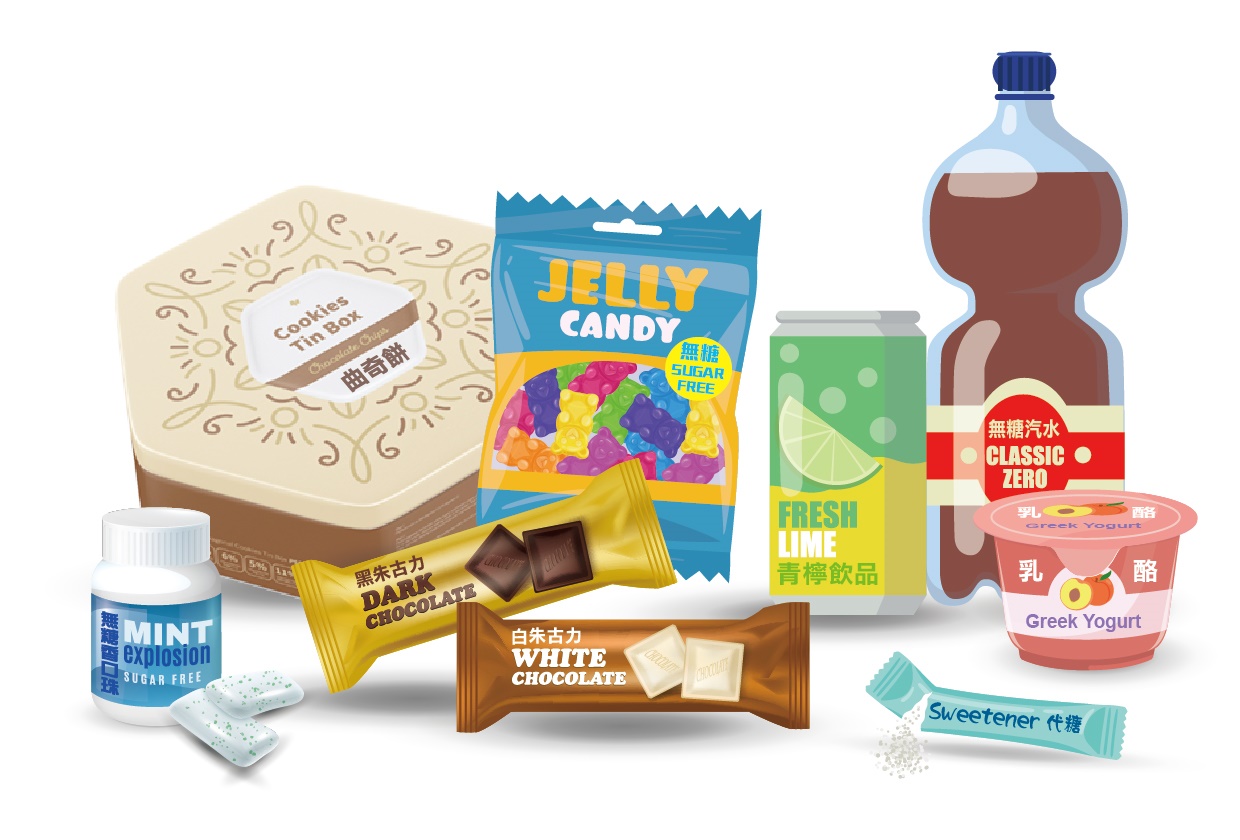
Food Safety Focus (217th Issue, August 2024) – Article 1
Sweeteners: Myths and Facts
Reported by Ms. Sosanna WONG, Scientific Officer,
Risk Communication Section, Centre for Food Safety
Sweeteners have been used for decades to help to reduce sugar intake. Even though you may not add sweeteners in your diet, sweeteners are often used as ingredients in various food products, especially soft drinks and candies. Despite sweeteners' long history of safe usage, there have been concerns about their potential health risks. In this article, we are dispelling some of the fallacies about sweeteners.
What are Sweeteners?
Sweeteners are food additives that are used instead of sugars to sweeten foods/beverages. Non-nutritive sweeteners, e.g. aspartame and saccharin, are substantially sweeter (30 to 20,000 times sweeter) than table sugar, thus, smaller amounts can achieve the same level of sweetness as sugars in food. Since only tiny amounts of non-nutritive sweeteners are required, their caloric contribution is negligible.
Another type of sweeteners is sugar alcohols (also known as polyols or polyhydric alcohols), e.g. sorbitol and xylitol, which are carbohydrates naturally found in small amounts in fruits and vegetables and are also produced commercially. Unlike non-nutritive sweeteners, sugar alcohols are generally not as sweet as table sugar; their sweetness ranges from 25% to 100% to that of table sugar. Since they are incompletely absorbed after ingestion, they contribute less calories as compared with sugars.

Figure 1. Common food products with sweeteners on the market
Truth about Sweeteners
Are all sweeteners artificial?
While some sweeteners are artificially made, e.g. aspartame and saccharin, some are derived from plants, e.g. steviol glycosides and sorbitol.
Are sweeteners safe?
Like other food additives, sweeteners have undergone rigorous safety evaluation before permitted for food use. International and national food safety authorities, such as the Joint FAO/WHO Expert Committee on Food Additives (JECFA), evaluate the safety of sweeteners based on scientific reviews of all available toxicological and related data.
Concerns about sweeteners and cancer initially arose when early animal studies linked certain sweeteners (i.e. cyclamate and saccharin) with bladder cancer in laboratory animals. However, subsequent studies of the permitted sweeteners showed that there was no evidence demonstrating that sweeteners would cause cancer in humans. The International Agency for Research on Cancer (IARC) classified cyclamate and saccharin as not classifiable as to their carcinogenicity to humans (Group 3).
Recently, IARC in 2023 classified aspartame as possibly carcinogenic to humans (Group 2B) based on limited evidence for carcinogenicity in humans. Nonetheless, JECFA, based on the evidence from animal and human studies, considered that aspartame had not been found to have adverse effects after ingestion, and the evidence of an association between aspartame consumption and cancer in humans was not convincing. JECFA concluded that dietary exposure to aspartame within the previously established Acceptable Daily Intake of 0-40 mg/kg body weight did not pose a health concern.
Can sweeteners be used for weight control?
While sweeteners are safe for consumption, the World Health Organization (WHO) released in 2023 a guideline which recommended against the use of non-sugar sweeteners (NSS) to control body weight. The recommendation was based on the findings of a systematic review of the available evidence which suggested that the use of NSS did not confer any long-term benefit in reducing body fat in adults/children. However, WHO acknowledged that the evidence might have been confounded by baseline characteristics of study participants and complicated patterns of NSS use. WHO also remarked that the guideline did not apply to sugar alcohols or individuals with existing diabetes.
WHO advised that the key to weight control is to achieve an energy balance between calories consumed and burnt. People need to consider other ways to reduce free sugars intake, such as consuming food with naturally occurring sugars, like fruit, or unsweetened food and beverages. To improve health, people should reduce the sweetness of the diet altogether, starting early in life.
How are Sweeteners Regulated?
In Hong Kong, sweeteners are regulated under the Sweeteners in Food Regulations (Cap. 132U). At present, a total of ten permitted sweeteners are listed under Cap.132U. To align with the latest international developments on the regulation of sweeteners in food, the Centre for Food Safety has commenced the work to review the regulatory control of sweeteners. Sweeteners should be used under the condition of Good Manufacturing Practice with the quantity added to food limited to the lowest possible level necessary to accomplish the desired effect. Moreover, all prepackaged foods added with sweeteners are required to be properly labelled with their functional classes and specific names or identification numbers.
Advice to the Trade
- Reduce the sweetness of food products by using less sugar or fewer sweeteners.
- Ensure products comply with local regulations, including food additives and labelling requirements.
Advice to the Public
- Maintain a balanced diet and select foods/beverages with less or no sugar/sweetener added.
- Read food labels to make informed choices.

